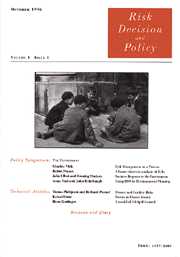Article contents
Some econometric evidence contradictory to the received wisdom on health and religion
Published online by Cambridge University Press: 02 January 2001
Abstract
It is not uncommon for the invading economist to arrive at radically different conclusions in areas of social inquiry, hitherto left to specialists from other fields. For example, before the arrival of Chicagoan economics, the received wisdom in the criminological field was that deterrent punishments (especially capital punishment) did not work. In this paper, we attend to the simple question: ‘Is religion a beneficial influence on the health of individuals?’ This has not hitherto attracted much attention from economists. However, epidemiological studies have overwhelmingly concluded that the answer to the above question is ‘yes'. In the context of a simple two equation recursive set up, this paper provides sharply contrasting evidence of there being no relationship between the two variables except where an arbitrary five point measure of subjective health status is used. Although the relationship in this case is negative in accordance with the received wisdom, its magnitude is so small that it may be dismissed as inconsequential for reasons discussed in the main body of the paper. This paper deals solely with physical health unlike some of the prior research which also investigates mental health status.
- Type
- Technical article
- Information
- Copyright
- © 2000 Risk Decision and Policy
- 2
- Cited by




